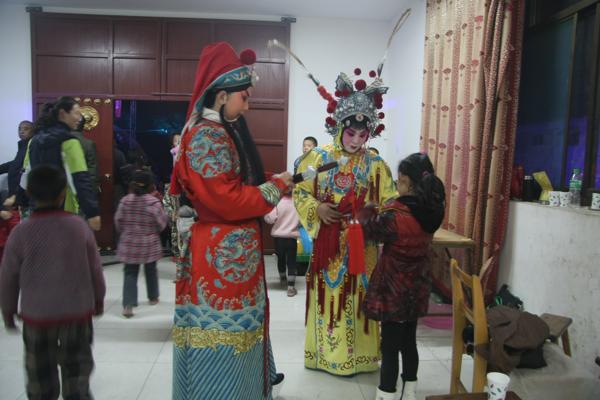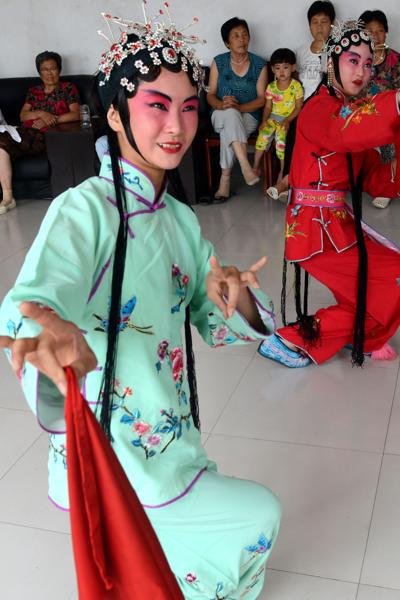
Performers from the Hebei Bangzi Opera troupe in Zhengding county prepare for an appearance in front of villagers.[Photo/Provided to China Daily]
Lack of performers, falling interest and limited funding pose threat to future of county companies
Opera performer Zhang Fanghua retired from a troupe in Heibei province three years ago when she reached the age of 50 — but she is working harder than ever.
She continues to appear in productions staged by the troupe, which specializes in the regional genre known as Hebei Bangzi Opera, even though the fact she is retired means she receives no salary.
“I did not leave because the troupe could not continue to stage productions without me as no one from the younger generation wants to join,” said Zhang. “Several other members have also kept working in retirement.”
The troupe in Zhengding county has only 18 staff members, including the musicians who accompany the actors and actresses, and they are all in their 40s and 50s.
Ma Fuli, the troupe’s deputy leader, said: “It’s not nearly enough to play a whole show, and we need to recruit amateurs for the walk-on parts. What will happen when we become too old to perform?”
The troupe is one of the oldest in the province — it was founded in 1954 — and has a distinguished history, but it is hard to see it continuing.
The county government booked the troupe to perform for three nights over the Spring Festival holiday for a fee of 20,000 yuan ($3,220), “the most generous offer we received over the past year,” according to Ma.
However, there were not enough actors and actresses to stage a full play. In order to reach the required show length of two-and-a-half hours, scenes requiring small casts from a number of plays were performed.
Troupes in the neighboring counties of Lingshou and Xingtang closed down 20 years ago. The struggle to survive is not only a problem for subsidized county troupes, but is widespread in cities and private troupes.
Jia Zhansheng, a senior researcher at the provincial government’s culture bureau, said, “It’s time to pay more attention local opera.”

Two young performers appear on stage after taking part in a series of free Hebei Bangzi Opera training courses offered by an experienced local performer in Haixing county, Hebei province.[Photo by MA NING/XINHUA]
6-year apprenticeship
As with other genres such as Peking Opera, performers in Hebei Bangzi Opera must practice for years to perfect the necessary skills.
Cui Xiubin, leader of the Hebei Bangzi Opera troupe in Pingshan county in the provincial capital, Shijiazhuang, said, “It usually takes a young person at least six years before they are able to sing on stage.”
Performers only start to earn money when they appear on stage — they receive nothing during their years as apprentices apart from free meals.
Many young people would rather work on construction sites than learn to appear in local opera “because it’s too tiring to practice and the money is too little to support a family,” Cui said. He added that no one applied to join his troupe as an apprentice in 2014.
The Zhengding troupe persuaded only three people to stay out of more than 100 apprentices it taught since the 1980s.
The number of students taking training courses offered by the province’s colleges has fallen sharply in recent years.
Hebei Vocational Art College, the only school with a major in Hebei Bangzi Opera, is proud of the quality of its students. Out of 80 who took the major, 80 percent continued their studies in higher universities such as the National Academy of Chinese Theater Arts.
Peng Huiheng, a teacher at the college, said, “Sadly they changed their majors from Hebei Bangzi Opera to other operas in their higher studies. There are fewer and fewer professional singers for our local opera.”
In addition to the long training and exacting standards, the low rates of pay offered by troupes is another factor that drives young people away. County troupes offer monthly salaries of around 2,000 yuan. Many singers move from local troupes to private companies, or switch to other careers.
Zhang Fanghua, the retired actress in Zhengding, said, “It’s a pity to lose experienced singers.”
Yao Baowu, the manager of the Xiangyuanqing Company, which runs a private Hebei Bangzi Opera troupe in Beijing, said he has lured performers from county and city troupes by offering higher pay of around 4,500 yuan a month.
“Private troupes have better stage sets and costumes, and this helps them to attract audiences and make more money,” Yao said.
Unlike private troupes, the county troupes are affiliated to governments and receive subsidies from them.
However, many say the limited funding they get makes it difficult for them to replace costumes and other items. The Zhengding troupe receives 100,000 yuan a year, barely enough to cover salaries, and this leaves little for other items.
Jia, the researcher, said the arts industry has been reformed in the province over the past 10 years. This has led to many of the public troupes being encouraged to cut their bonds with governments and make their own way in the market.
“However, these troupes find it hard to establish a new position, and local opera has attracted smaller audiences in recent years,” Jia said.
Most of the troupes perform in villages where it is difficult to make much money, he added.
Extra measures needed
“The lack of supplementary policies to facilitate the reforms, such as introducing measures to protect the interests of senior performers, has made it hard for them to survive in the market.”
The private troupe in Beijing has boosted its profits by writing plays for clients, said Yao. This year, it will perform a modern Hebei Bangzi Opera play for Yanqing county in Beijing about the bid to host the 2022 Winter Olympics.
“The 40-minute play will demonstrate the efforts taken to support the bid, such as curbing air pollution,” said Yao, “It’s a way to make our performances fit the times.”
Some county troupes are also writing modern plays about current topics in an effort to attract larger audiences.
Cui, of the Pingshan troupe, said, “To some degree, it has alleviated our shortage of funds.”
Before 2012, the county government allocated the troupe 120,000 yuan annually. It started to stage its modern play The White-haired Girl the following year, and went on to perform it at the Great Hall of the People.
“After that, the troupe got 700,000 yuan from the government, and the audience began to know about us,” he said.
Jia said governments should provide special subsidies.
“Governments must play a bigger role to support local opera and help it to continue and prosper,” he added.
